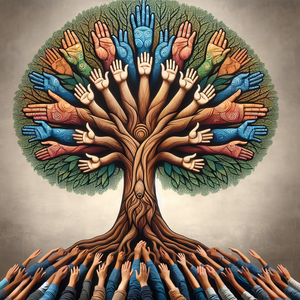The Rise of Spanglish: A New Linguistic Frontier

Spanglish is not merely a combination of Spanish and English; it is a profound representation of cultural identity for countless bilingual individuals, especially within the United States. For many speakers, Spanglish is a linguistic tapestry woven from the threads of their lived experiences, symbolizing the duality of their existence between two cultures. It serves as a linguistic bridge that enables speakers to articulate thoughts and emotions in a manner that feels authentic and relatable. The cultural significance of Spanglish manifests in everyday conversations and social interactions. It provides a vehicle for expressing complex identities, allowing speakers to navigate the intricacies of their environments. For instance, phrases like '¿Vamos a chill out?' or 'I’m feeling muy cansado' exemplify how speakers fluidly transition between languages to convey their sentiments. This linguistic fluidity is particularly prevalent among younger generations, who often embrace Spanglish as a badge of honor, asserting their unique identity in a society that frequently seeks to define and categorize them. The impact of Spanglish extends into popular music, where artists like Pitbull and Shakira frequently incorporate it into their lyrics. Their music not only reaches a diverse audience but also celebrates a rich bilingual heritage. By blending Spanish and English, these artists create a cultural touchstone that resonates with listeners navigating the complexities of identity in a multicultural landscape.
Usage in Media
The prominence of Spanglish has surged in media, where it has carved out a significant niche in television, film, and literature. Programs such as 'Jane the Virgin' and 'One Day at a Time' have pioneered the use of Spanglish, showcasing characters who effortlessly switch between languages. This representation is crucial; it normalizes the use of Spanglish and validates the experiences of bilingual individuals, providing a platform for their stories to be told. Moreover, Spanglish has infiltrated advertising strategies, with brands targeting the bilingual market using a mix of English and Spanish to engage their audience. This linguistic approach not only broadens the reach of marketing campaigns but also acknowledges the cultural nuances inherent in bilingualism. By utilizing Spanglish, brands can create messaging that feels relatable and authentic, helping them connect with consumers on a deeper level. For example, campaigns that employ phrases like '¡Just do it!' combine the familiarity of English with a cultural resonance that appeals to bilingual audiences.
Implications for Language Identity
The growing acceptance of Spanglish raises critical questions about language identity and preservation. Critics argue that the use of Spanglish may dilute the integrity of both Spanish and English, threatening their purity. In contrast, proponents maintain that Spanglish enriches both languages, capturing the realities of modern bilingual life. The reality, however, is that language is inherently fluid and adaptable. Just as languages have evolved over centuries, Spanglish stands as an organic evolution that captures the spirit of a contemporary generation. For many bilingual speakers, Spanglish serves as a form of empowerment, facilitating navigation through their multifaceted identities in a world that often feels divided. By embracing Spanglish, speakers reclaim their narratives and challenge the notion that language must conform to rigid standards. Spanglish fosters a sense of belonging and community among those who share similar experiences, creating a shared space where diverse identities can coexist harmoniously.
The rise of Spanglish exemplifies the dynamic nature of language and identity in our interconnected world. It captures the experiences of millions of bilingual speakers who navigate the complexities of living between two cultures. Through its cultural significance, its representation in media, and its implications for language identity, Spanglish emerges as a powerful symbol of linguistic innovation and cultural expression. As we continue to explore the intersections of language and identity, Spanglish invites us to embrace the richness that arises from blending languages and celebrating our diverse heritages. In doing so, we foster a deeper understanding of the human experience—one that is as multifaceted and vibrant as the languages we speak. In a world that is constantly evolving, Spanglish stands at the forefront of linguistic creativity, reminding us that language is not a static entity but a living testament to our shared human experience.
Bilingual Content Strategist
Advertising agencies, media companies, multicultural marketing firms
Job Description
Develop and execute content strategies that effectively utilize Spanglish to engage bilingual audiences.
Collaborate with creative teams to ensure that marketing materials reflect cultural nuances and resonate with diverse demographics.
Skills Required
Proficiency in both English and Spanish
Strong understanding of bilingual marketing trends
Experience with content management systems
Cultural Linguist
Academic institutions, research organizations, cultural advocacy groups
Job Description
Analyze the evolution and usage of Spanglish within specific communities to provide insights for academic and commercial applications.
Conduct interviews and surveys to gather qualitative data on language use and identity among bilingual speakers.
Skills Required
Advanced degree in linguistics or a related field
Strong research abilities
Familiarity with sociolinguistics
Bilingual Marketing Manager
Consumer brands, media companies, bilingual marketing agencies
Job Description
Oversee marketing campaigns that incorporate Spanglish to connect with bilingual consumers effectively.
Monitor market trends and consumer behavior to adapt messaging and strategies accordingly.
Skills Required
Experience in digital marketing
Fluency in English and Spanish
Strong project management skills
Multicultural Communications Specialist
Non-profit organizations, media outlets, corporate communications departments
Job Description
Create and implement communication strategies that address the needs of bilingual audiences, using Spanglish where appropriate.
Work with PR teams to craft press releases and media content that authentically represent cultural identities.
Skills Required
Excellent writing and verbal communication skills in both languages
Understanding of cultural sensitivities
Experience in public relations
Social Media Coordinator for Bilingual Audiences
Digital marketing firms, entertainment companies, community organizations
Job Description
Manage social media platforms with a focus on creating engaging content that reflects the Spanglish-speaking community's culture.
Analyze engagement metrics to refine strategies and enhance audience interaction.
Skills Required
Proficiency in social media management tools
Creativity in content development
Fluency in English and Spanish


